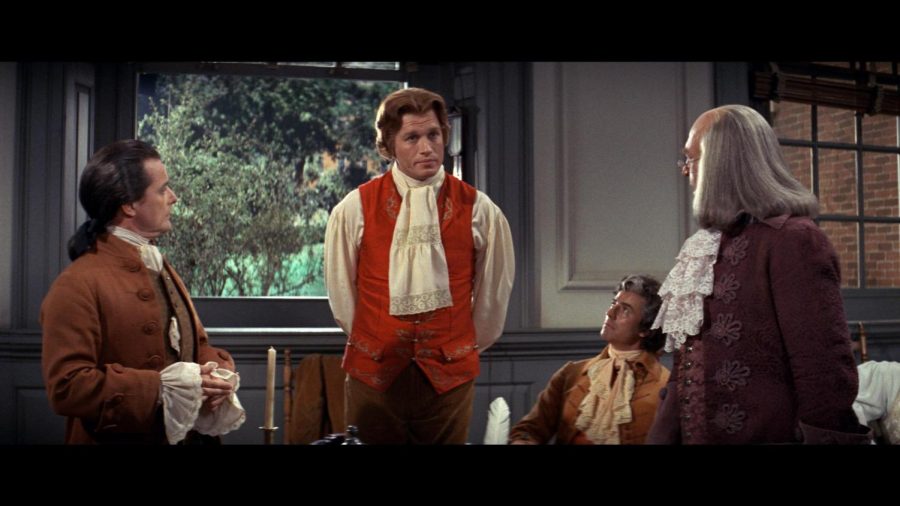Hidden Gem: “1776” (1972)
Howard Da Silva, William Daniels, Ron Holgate and Ken Howard star in “1776”.
Nov 3, 2020
On this Election Day, let’s pause from the months of divisive partisan politics and focus on an overlooked film adaptation that dealt with our nation’s beginning. This is director Peter H. Hunt’s 1972 film version of “1776,” the Tony Award-winning musical celebration of our founding fathers’ revolutionary actions during the Second Continental Congress, leading to the signing of the Declaration of Independence.
This underappreciated film starred three of the original Broadway cast members, William Daniels as John Adams, Ken Howard as Thomas Jefferson and Howard Da Silva as Benjamin Franklin. While it is not nearly as brilliant as Lin-Manuel Miranda’s “Hamilton,” this Peter Stone play, which featured the words and lyrics by Sherman Edwards, was still very impressively patriotic.
The film is mostly set in and around one main congressional building in Philadelphia in June and early summer of 1776. It begins with a frustrated and angry John Adams, a delegate from Massachusetts, complaining about his fellow Americans’ hesitance to vote directly for independence. His fellow patriots break into the song “Sit Down, John,” deploring him just to shut up.
Soon we meet Ben Franklin as he sits for his portrait in a nearby garden and comments to his friend John that he is a bit too obnoxious, and his shrill voice is irritating. A parade of other colonial delegates comes to the congressional gathering, each reflecting their unique regional pride. Many of these characterizations are incredibly robust, if not always touched with light comedy.
Richard Henry Lee arrives on horseback and begins singing about the great “Lees of Old Virginia.” A new delegate from Georgia, Mr. Hall, follows, then we meet Thomas Jefferson from Virginia. Finally, the stern John Dickinson from Pennsylvania enters; he believes all this foolish talk of independence will lead only to charges of treason and then hangings. The Congress is presided over by John Hancock of Massachusetts, who tries to keep order on this hot June day while swatting flies from his desk.
Get The Daily Illini in your inbox!
When a dispatch from General Washington arrives stating British troops had left Nova Scotia heading toward New York to divide the New England colonies, Adams quickly pushes for a vote for independence. Dickinson stands firm with other southern colonies and rejects such a vote. When he calls his colleagues “fellow Englishmen,” Franklin takes offense. Franklin declares he wouldn’t mind the name if “were I given the full rights of an Englishman — but to call me one without those rights is like calling an ox, a bull. He’s thankful for the honor, but he’d much rather have restored what’s rightfully his.”
Oona White’s simple choreography and Sherman Edwards’ mostly delightful songs add to this tale’s light and comical tone, yet different lyrics add a witty sense of colonial patriotic fervor. Several of the more effective songs include “Cool, Cool Considerate Men,” “Molasses to Rum,” about the hypocrisy of slave ownership, and “The Egg,” a symbolic song of the birth of the new nation sung by Jefferson, Franklin and Adams. At the same time, the delegates debate the content of Jefferson’s draft of the declaration.
In the 1995 book “Past Imperfect: History According to the Movies, an anthology of critical essays from the Society of American Historians,” author and historian Thomas Fleming focuses on “1776” and claims Stone “gets a number of things right.” From the raging conflict with the Founding Fathers, the fiery debate over independence to the quarreling among the northerners and southerners over slavery with the effective depictions of “the hot-headed, loquacious John Adams, the diffident and reticent Thomas Jefferson and the starchy, pompous John Dickerson of Pennsylvania.”
Yet, according to Fleming, the film missed the mark on the role of the Continental Army’s important role and the military optimism experienced in early 1776, as well as the somewhat overly light-hearted portrayal of Ben Franklin and downplaying Jefferson’s worries over his ailing wife.
One last note of bipartisan justice, “1776” received a special pre-release screening at the White House for President Richard Nixon because he was a friend of the film’s producer, Jack Warner. Nixon was quite upset over “Cool, Cool Considerate Men,” depicting the power-hungry conservative founding fathers and demanded Warner cut the critical song, and it was cut. Yet, when the director’s cut of the film was finally released on DVD in 2002, returning the film to its 165-minute running time, that song was rightfully restored to the film.






